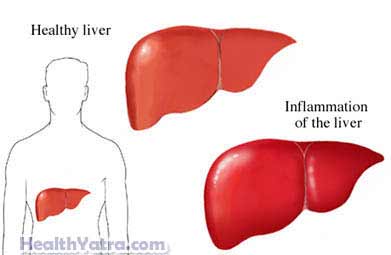تعريف
Hepatitis is inflammation of the liver. Toxic hepatitis refers to inflammation of the liver due to medication or exposure to toxic (poisonous) chemicals. Inflammation is a response by the immune system to an infection, irritation, or injury that often results in swelling and harm to the affected tissue.

أسباب
A major job of the liver is to process and breakdown (ie, metabolize) foreign substances contained in the blood, including nutrients and chemicals. Some chemicals or drugs that are difficult for the liver to process can damage it, resulting in inflammation.
Some substances associated with toxic hepatitis include:
- الأدوية:
- Acetaminophen (found in pain relievers)
- مضادات حيوية معينة
- Isoniazid (used to treat tuberculosis)
- Halothane (general anesthetic)
- Statins (for high cholesterol)
- Methyldopa (for hypertension)
- Gold compounds (for rheumatoid arthritis)
- Herbs and dietary supplements:
- Comfrey
- Kava
- Mistletoe
- Certain combinations of traditional Chinese medical herbs
- High doses of vitamin A
- Chemicals:
- Carbon tetrachloride (now banned in industry)
- Chloroform
- Phosphorous
- Dimethylformamide
عوامل الخطر
A risk factor is something that increases your chance of getting a disease or condition. The way the liver processes drugs and chemicals varies from person to person, so not everyone will become sick from the same substance.
However, exposure to large quantities of even minimally harmful toxins, or multiple different toxins simultaneously, can increase the risk of toxic hepatitis. Patients who consume alcohol excessively or have liver disease are at greater risk of toxic hepatitis when exposed to one or more of its causes.
الأعراض
Symptoms of toxic hepatitis include:
- Jaundice (yellowing of the eyes and skin)
- الغثيان
- القيء
- Dark or brown-colored stools
- White or light-colored stools
- فقدان الشهية
- ألم في البطن
التشخيص
There is no specific test to diagnose every case of toxic hepatitis. To make the diagnosis, a doctor will perform a thorough history, asking questions about the use of medications (prescription and over-the-counter) and possible chemical exposures, particularly at the workplace.
A physical exam can help determine the size of the liver and any associated tenderness, and a blood test can assess how well the liver is functioning. In some cases, your doctor may recommend a liver biopsy to directly assess liver tissue.
العلاج
There is no medication to treat most types of toxic hepatitis. If a person is diagnosed with this condition, the chemical or drug should be discontinued immediately and avoided in the future. If symptoms are severe, the patient should rest. Intravenous fluid is recommended for people who experience extreme nausea and vomiting.
Symptoms usually go away within a few days or weeks. However, in severe cases, or if the condition was left untreated, toxic hepatitis can lead to irreversible liver failure, which is fatal in the absence of a liver transplant.
الوقاية
Exposure to toxic substances in the workplace can be prevented with proper use of protective clothing and gear. People who are at risk due to liver disease should check with their doctor for a list of medications to avoid.
